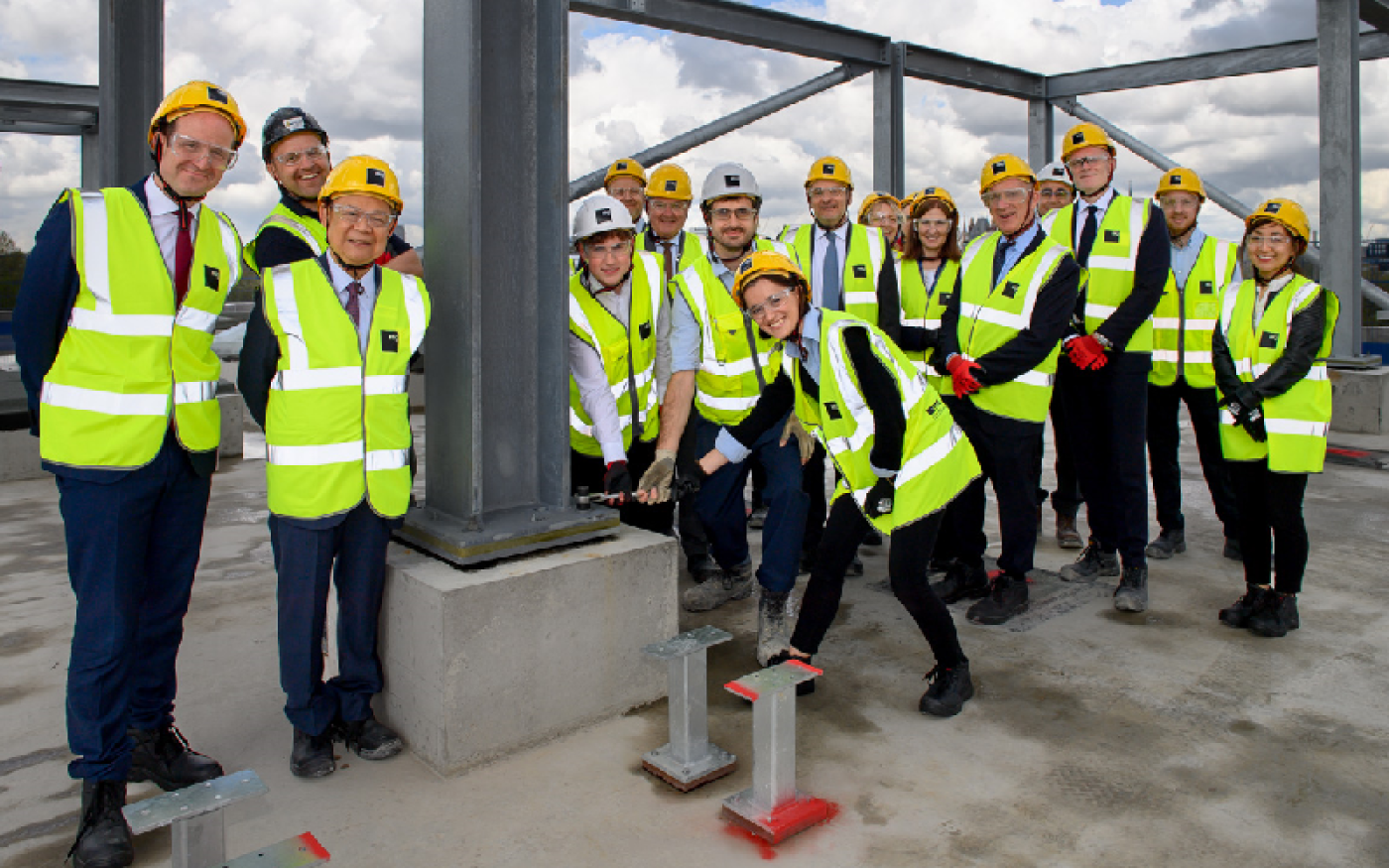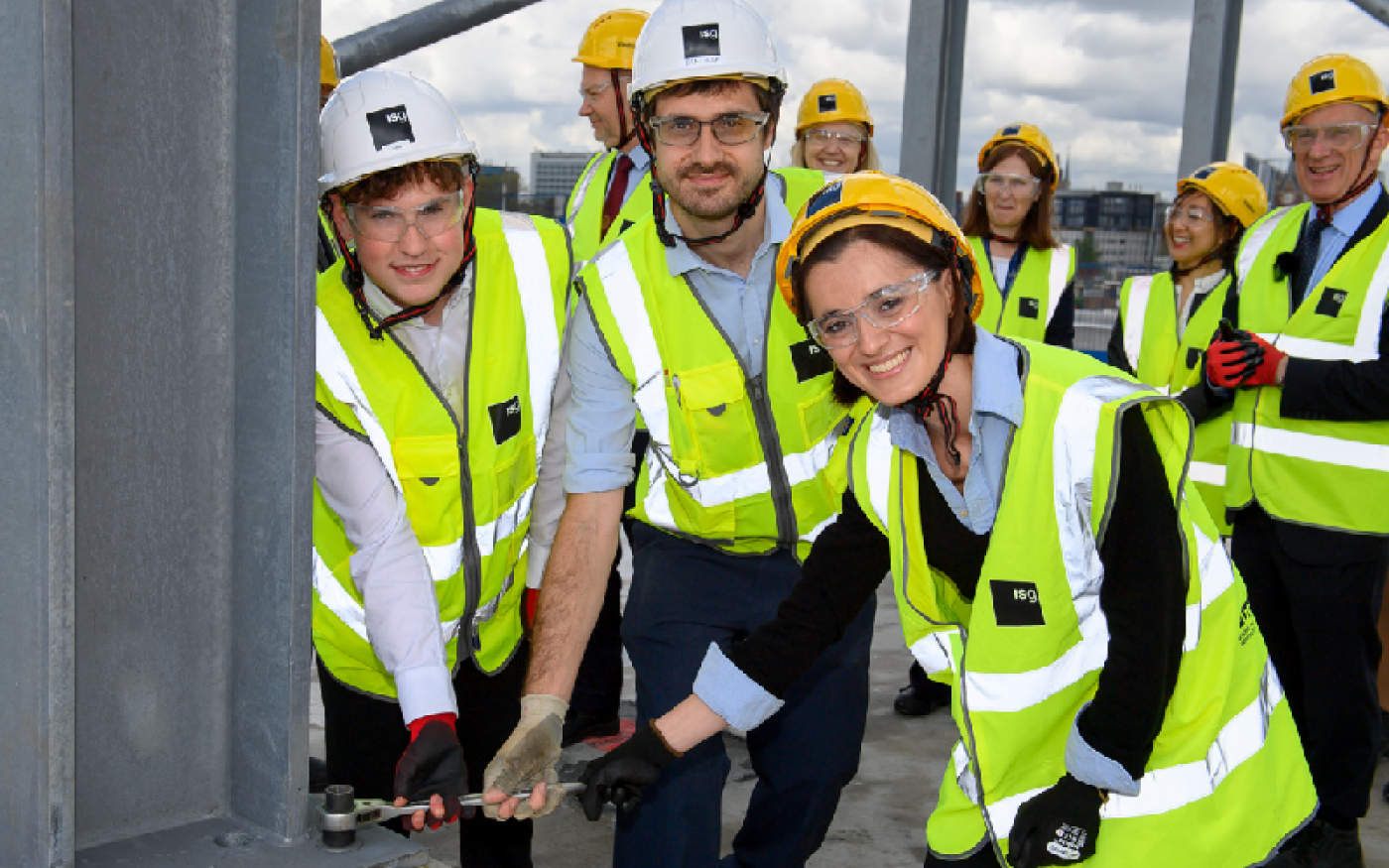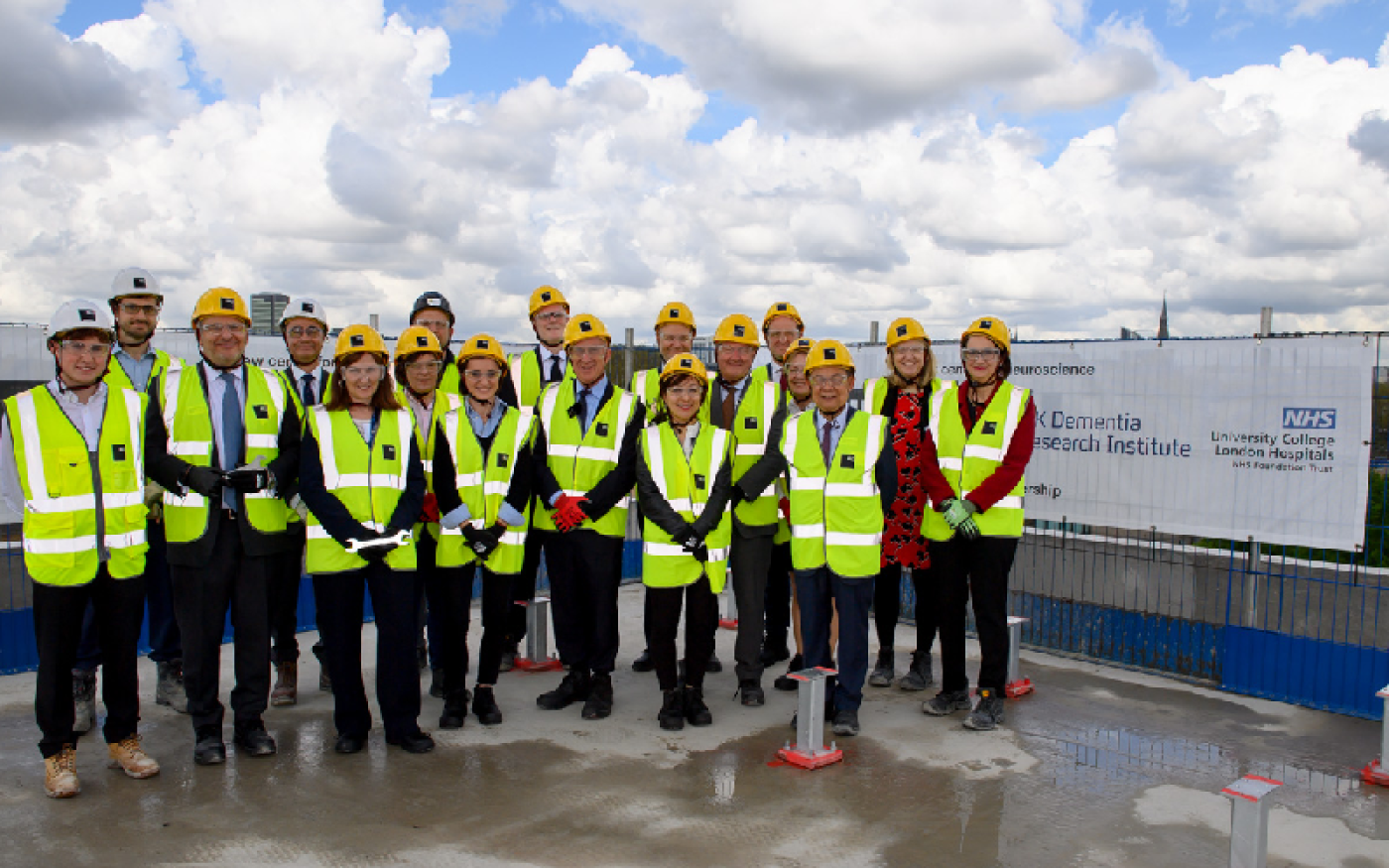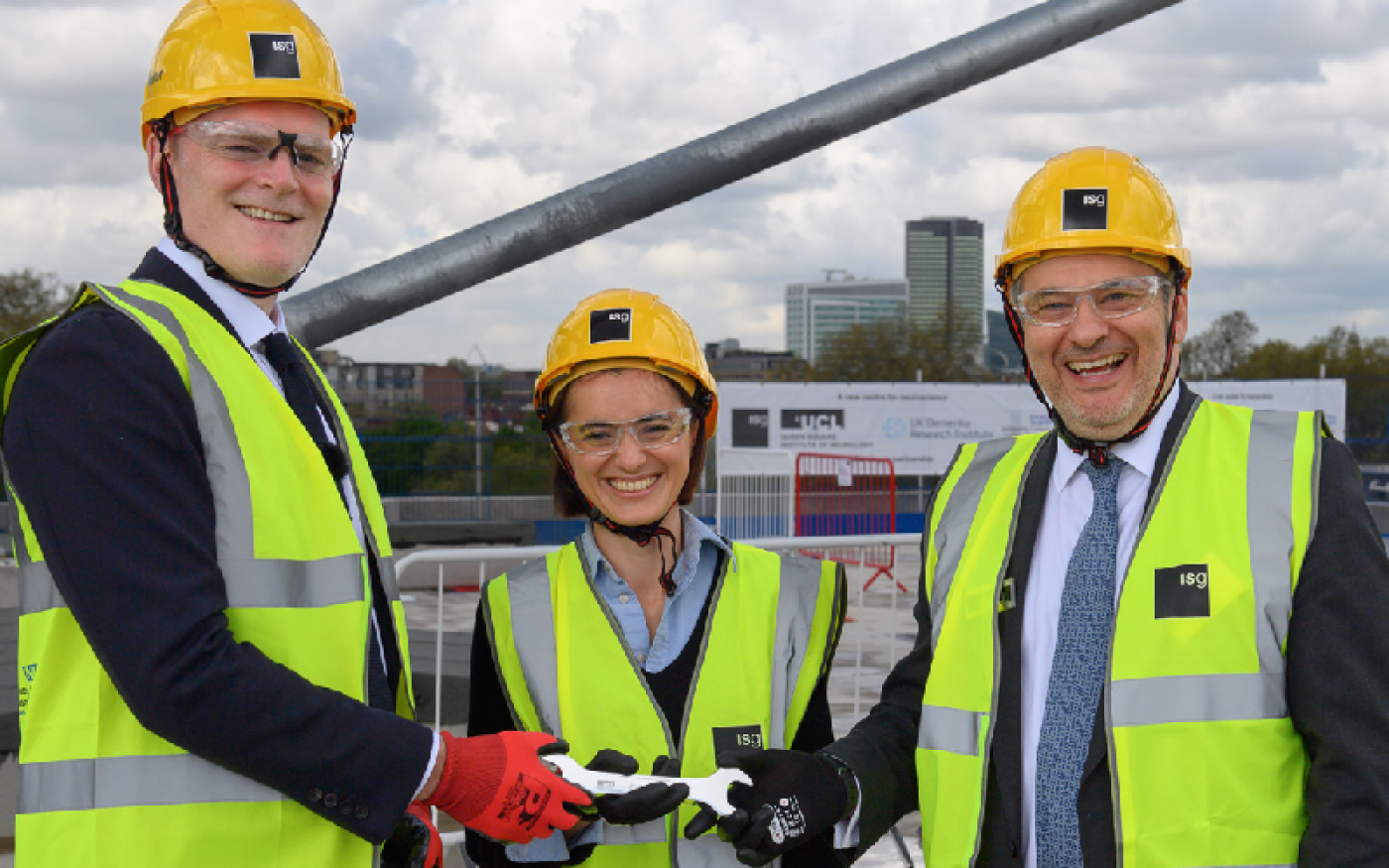UCL’s new world-class neuroscience building will reach the highest point construction milestone this month, celebrating with a ‘Topping Out’ ceremony on Thursday 11 May.
UCL world-class neuroscience centre building reaches highest point in construction

Putting on the final bolt at the Topping Out Ceremony @ 256 Grays Inn, 11th May 2023. Credit Kirsten Holst

Construction apprentice Jamie Darcy, Construction manager Dan Crisp with early career researcher Dr Micol Falabella at Topping Out Ceremony @ 256 Grays Inn, 11 May 2023. Credit Kirsten Holst

President and Provost Dr Michael Spence at Topping Out Ceremony @ 256 Grays Inn, 11 May 2023. Credit Kirsten Holst

Left to right: Prof. Alan Thompson, President and Provost Dr Michael Spence, David Probert, Victor Chu, Susan Wakeling, Susan Simon, Topping Out Ceremony @ 256 Grays Inn Rd, 11 May 2023. Credit Kirsten Holst


CEO of construction partners ISG Matt Blowers, Topping Out Ceremony @ 256 Grays Inn Rd, 11 May 2023. Credit Kirsten Holst

CEO of construction partners ISG Matt Blowers, Topping Out Ceremony @ 256 Grays Inn Rd, 11 May 2023. Credit Kirsten Holst

Left to right: CEO of construction partners ISG Matt Blowers, Dr Micol Falabella, Prof. Michael Hanna, Topping Out Ceremony @ 256 Grays Inn, 11 May 2023. Credit Kirsten Holst
UCL’s new world-class neuroscience building will reach the highest point construction milestone this month, celebrating with a ‘Topping Out’ ceremony on Thursday 11 May.
The centre on Grays Inn Road, London, aims to accelerate the discovery of treatments for neurological conditions, including dementia – for which there is still no known cure.
UCL is already one of the largest, most productive and highest-impact neuroscience centres in the world and the pioneering new building, due to open in 2024, alongside its Queen Square hub will be the first centre of its kind, translating ground-breaking discovery research into breakthrough treatments, with an on-site outpatient facility, allowing clinicians and researchers to work closer than ever before with people with neurological disorders and their families, their doctors and researchers.
The £281.6 million facility will be home to the UCL Queen Square Institute of Neurology; the UK Dementia Research Institute at UCL Centre and HQ (UK DRI) and the UCLH National Hospital for Neurology and Neurosurgery.
The new centre will house up to 1000 scientists, clinicians and patients together and enable advances to translate from bench to bedside and back again. As well as seven floors of shared labs, workspaces, consulting rooms and collaboration spaces for scientists and support teams, the building will host a MRI suite with five scanners in 2024, a 220-seat lecture theatre and a range of shared core facilities, equipment and core technology platforms including microscopy, transcriptomics and tissue processing to encourage new ways of working, collaboration and knowledge-exchange.
The sustainable design, by architects Hawkins\Brown also contains a variety of open and green spaces, including public access areas that the local community can access, as well as a café, open to the public.
The building is funded by UCL, the UK Research Partnership Investment Fund, the Medical Research Council, the UCL Dementia Research Retail Coalition and generous philanthropic partners, including: Iceland Foods Charitable Foundation, the Wolfson Foundation, the Garfield Weston Foundation, Mr Martin Lee and Mrs Cathy Lee, the National Brain Appeal, Brain Research UK, and more. The Founding Funders of the UK Dementia Research Institute are the Medical Research Council, Alzheimer’s Society and Alzheimer’s Research.
Professor Alan Thompson, Dean, Faculty of Brain Sciences said:
“The new UCL building at 256 Grays Inn Road has been an ambitious project, long in the making and it is wonderful to see it finally coming to fruition.
“UCL is a global leader in pioneering research into neurological conditions that cause disabling and distressing symptoms such as immobility and dementia and it can be a challenge to link researchers with clinicians, patients, industry, and students. This new purpose-built centre of excellence will enable that collaboration between these key groups to take place and, as a consequence, new treatments to be developed, tested and made available to our patients.
“Our goal is to translate discoveries into treatments and have a real impact on patients with disabling neurological conditions – one of the great unmet needs of society."
Professor Michael Hanna, Director UCL Queen Square Institute of Neurology said
“I am delighted we have reached this significant “topping out” milestone on our 11-year journey to create what will be a world leading translational neuroscience research environment. I have been privileged to have been part of this journey from the very beginning and seeing how good the building looks already is very exciting.
“I am sure it will be an inspiring environment where patients, doctors and scientists come together to ultimately translate research into treatments. I am incredibly proud of all the teams who have worked so hard to get us to this stage and I am sure that what we are creating together will be transformational in finding therapies for devastating neurological diseases.”
Professor Adrian Ivinson, Chief Operating Officer and Operations Director of the UK Dementia Research Institute said:
“We are on the cusp of some major scientific breakthroughs in dementia research that could accelerate our journey towards treatments for patients. While the bricks and mortar elements of this new building are extraordinary and will significantly advance our work, it is what will be housed within those walls that is truly exciting. The collaborations and the partnerships that will be forged across discovery research, translational science and patient care, combined with the cutting-edge technology available, will serve to speed our journey towards improving the lives and health of people living with dementia and other neurodegenerative diseases.
“We are immensely grateful for the leadership of UCL, its many donors and supporters, and the army of people who are turning our dream building into reality.”
David Probert, Chief Executive, University College London Hospitals, NHS Foundation Trust said:
“We are thrilled to be working with UCL on this exciting new centre for neuroscience, which will provide exceptional research and NHS patient treatment facilities to support patients with neurological conditions. As we celebrate reaching the highest point of the new building, we also celebrate the collaboration between science and medicine. It is through this collaboration that we will see increased patient participation in clinical trials and the delivery of life-saving, and life-changing, treatments.”
 Close
Close

